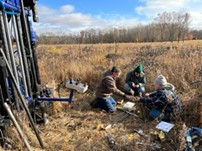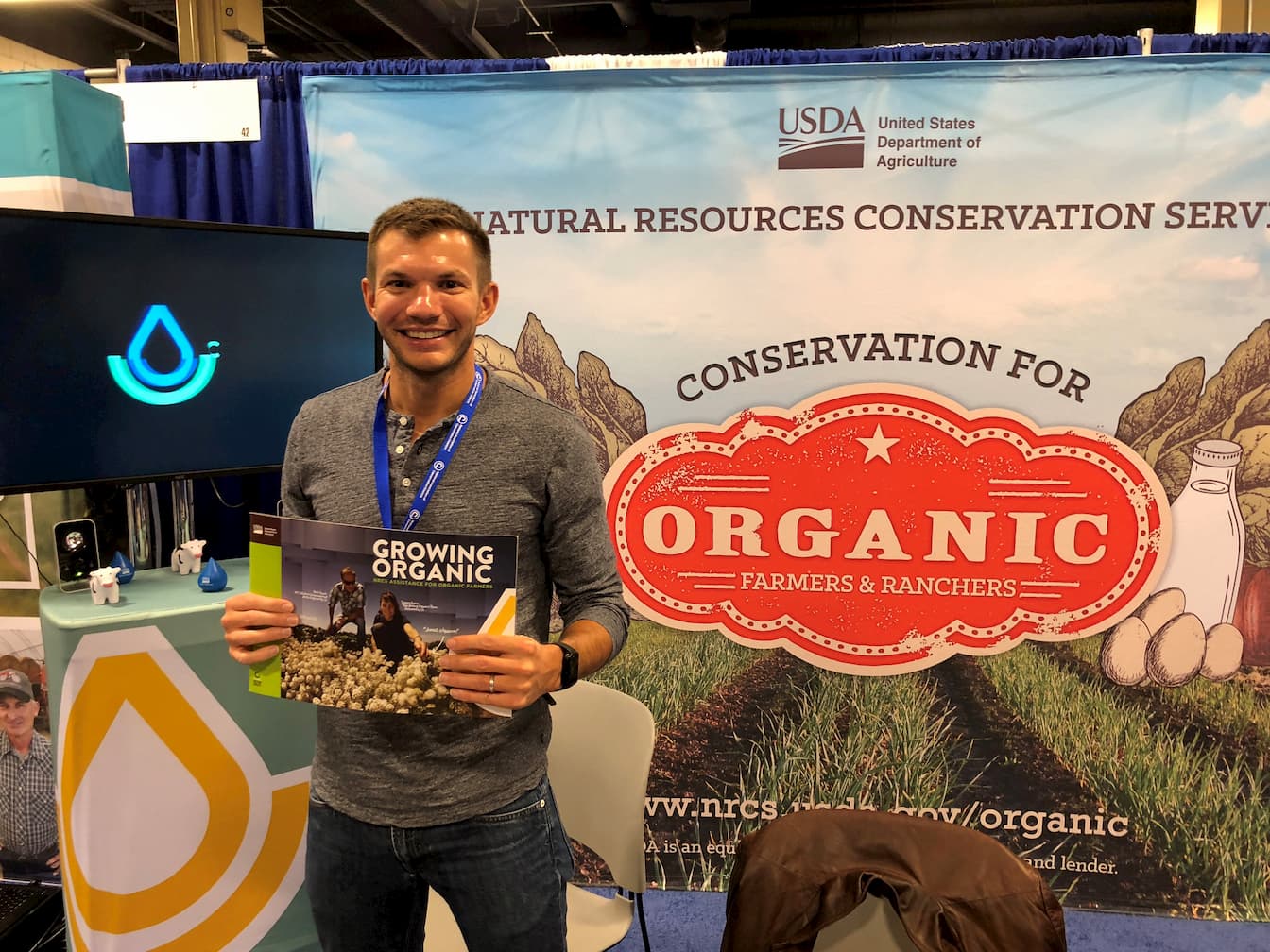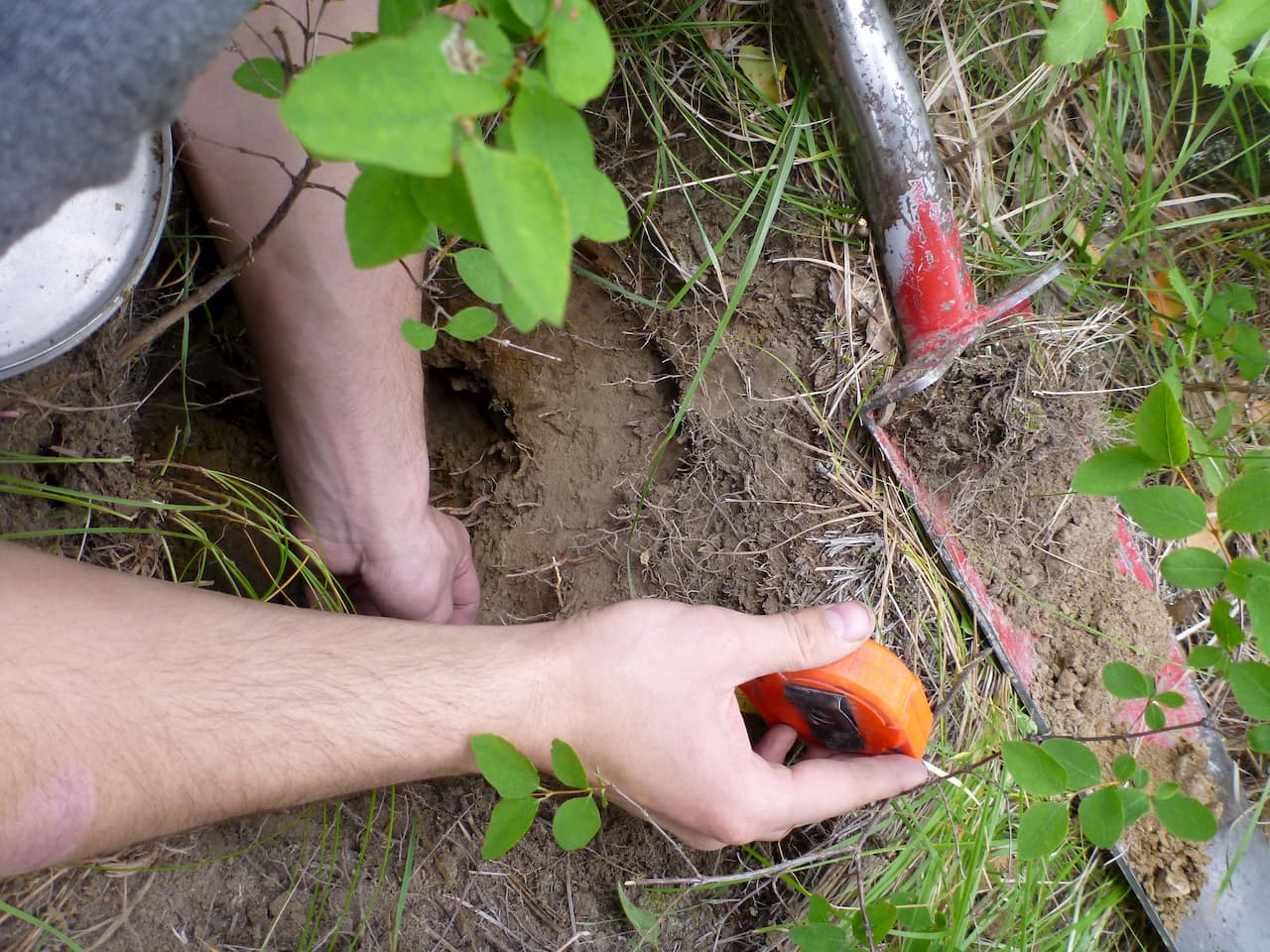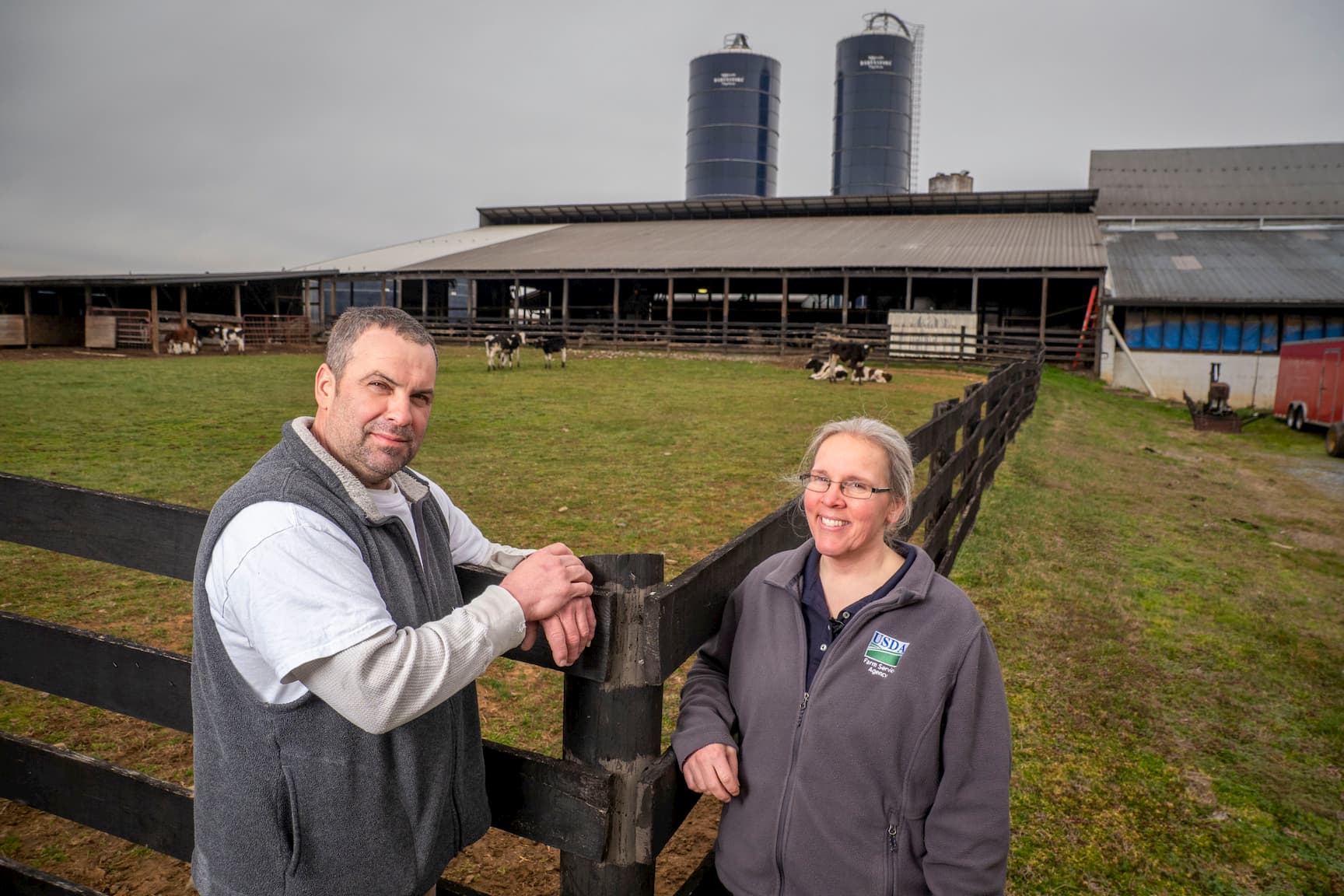Working for FSA, NRCS, RMA - FPAC
Search Jobs
If you’re ready to serve our nation’s farmers and ranchers, consider the opportunities with FSA, NRCS, RMA, and the Business Center!
We encourage all interested individuals to apply for positions at USDA, including veterans, people with disabilities, and surplus or displaced Federal employees.
The application process starts with creating profile on the USAJOBS website. Then, you can search for a specific job by keyword, agency, location, salary, occupation, etc.
Click the button below to jump start your search today!
Search For Jobs
Careers in FPAC
Come Join Us!
Do you want a career that can make a difference? We’re looking for highly motivated and skilled individuals interested in meeting the challenges of the dynamic and innovative field of agriculture. To get a better idea of what a career in one of these fields would be like, check out the summaries below.
Career Paths
Accountant
Accountants prepare and examine financial records. They assess financial operations and work to help ensure that the agency runs efficiently. As an Accountant at USDA, you would
- perform professional accounting functions requiring analytical, procedural, and technical skills;
- accounting studies and projects;
- assist in preparing findings for briefings and describing critical assumptions and decision points for decision-makers;
- establish and maintain reports for financial management activities.
Qualifications:
A four-year course of study leading to a bachelor’s degree or a bachelor’s degree in accounting, agricultural business, business administration or other related field from an accredited college or university.
Requires working knowledge and skills in accounting theory, concepts, principles, and standards. Also requires the ability to use automated financial management databases/systems and computer-generated products.

Administrative Assistants
Administrative assistants are the gatekeepers and process movers for many critical agency functions. Assistants keep the office running smoothly and help everyone from the managers to employees to the public. They answer phones, make travel reservations, schedule meetings, enter data and make sure things get routed to the right people for signatures. They are often the first contact our customers have greeting visitors and serving as receptionists for offices. There is never a dull moment at the office.
Qualifications:
College degree is not required for all positions in this field, but certificates and work experience are necessary for certain job sets.

Compliance Investigator
Crop insurance is implemented by private insurers through an agreement between USDA and insurance providers. In this position you would assess the compliance of policyholders, insurance agents, and insurance providers with agency policy and procedures. Investigators issue findings of fraud, waste, or abuse, or simply make recommendations for changes to improve policy or procedures. They also participate in negotiations with persons whose activities have been found to be at odds with agency guidelines.
Qualifications:
A four-year course of study leading to a bachelor’s degree or a bachelor’s degree in agricultural business or an investigative field from an accredited college or university.
Requires working knowledge of auditing/investigative techniques.

County Executive Director (CED)
- County Executive Directors (CEDs) are a vital part of the Farm Service Agency (FSA) County Service Center. They are the county office service center managers, responsible for directing and managing program and administrative operations, for the benefit of farmers, ranchers, and producers in their county.
- Responsibilities: CEDs perform duties in their county office(s), as well as out in the field with producers. They manage Program Technicians in their office(s), providing governance over the implementation of FSA commodity, conservation, and livestock programs. They also conduct outreach activities to connect producers to the office and the programs available.
- Impact: As a CED, you will be at the forefront of agricultural and rural development, working closely with farmers and ranchers to promote environmental and economic growth and sustainability. Your leadership will drive positive change to shape the future of your county.
Qualifications:
- We are actively seeking public servants, problem solvers, and hard workers possessing excellent leadership and supervisory skills. Successful CEDs have a passion for supporting local communities, and a commitment to exceptional customer service. We encourage you to apply and be part of our team.
 For more information on current vacancies and their respective qualifications, click the following link USAJobs.gov or scan the QR code.
For more information on current vacancies and their respective qualifications, click the following link USAJobs.gov or scan the QR code.

County Executive Director in Training
- County Executive Director in Training are guided through a one-year management and program training class with the Farm Service Agency (FSA) County Executive Directors. They work closely with farmers and ranchers to perform office and field activities as needed to accomplish program objectives.
- Development & Responsibilities: This program provides training on managerial skills and program regulations and applies this practical knowledge to everyday operations in the county office. Upon successful completion of the trainee program, candidates are eligible for placement as a County Executive Director.
- Impact: In this role, you’ll be at the forefront of agricultural and rural development, working closely with farmers, ranchers, and diverse agricultural operations to promote growth and sustainability. Your leadership will shape the future of your county and state, fostering economic prosperity and driving positive change.
Qualifications:
- We are actively seeking public servants, problem solvers, and hard workers with a passion for supporting local communities, and a commitment to exceptional customer service. We encourage you to apply and be part of our team.
 For more information on current vacancies and their respective qualifications, click the following link USAJobs.gov or scan the QR code.
For more information on current vacancies and their respective qualifications, click the following link USAJobs.gov or scan the QR code.

County Program Technician
 Job Description:
Job Description:
- County Program Technicians (PTs) are a vital part of the Farm Service Agency (FSA) County Service Center. They are the first line of communication with the farmers, ranchers, and producers we serve. This role provides support for the agricultural industry by helping implement FSA programs
- Responsibilities: Explaining program provisions, benefits, and options to producers, initiating contact to obtain required information and assisting them in the completion of forms, among other office duties.
- Impact: As a County Program Technician, your service to farmers, ranchers, and producers in your county and state helps stimulate an economically and environmentally sound future for American Agriculture.
Qualifications:
- We are actively seeking public servants, problem solvers, and hard workers with a passion for supporting local communities, and a commitment to exceptional customer service. We encourage you to apply and be part of our team.
 For more information on current vacancies and their respective qualifications, click the following link USAJobs.gov or scan the QR code.
For more information on current vacancies and their respective qualifications, click the following link USAJobs.gov or scan the QR code.
Economist
Economists study the production and distribution of resources, goods, and services by collecting and analyzing data, researching trends, and evaluating economic issues. Economists are required to demonstrate professional knowledge of economics as they: research into economic phenomena, analyze economic data, and the prepare interpretive reports; advise and consult on economic matters to governmental officials and private organizations or citizens.
At USDA, you’ll consult in the development of crop policies, assessment of world markets impact on supply and pricing, and development of price and actuarial models and methods.
Qualifications:
A four-year course of study leading to a bachelor’s degree or a bachelor’s degree in agricultural economics, mathematics, statistical analysis, or other agricultural or mathematics field from an accredited college or university.
Requires knowledge of agricultural economic and business principles and their application of principles of crop insurance.

Engineer
USDA employs many engineers who have specialized skills in erosion control, water management, structural design, construction, hydraulics, soil mechanics, and environmental protection. We also employ those with general engineering skills. Your job assignments may include restoring streams, controlling erosion, developing water systems for livestock, improving and conserving irrigation water, or restoring wetlands. As an engineer, you will help solve a host of natural resource problems and may also become involved in helping communities recover from natural disasters.
At USDA, you’ll consult in the development of crop policies, assessment of world markets impact on supply and pricing, and development of price and actuarial models and methods.
Qualifications:
A four-year course of study leading to a bachelor’s degree or a bachelor’s degree in engineering from an accredited college or university.
To be acceptable, the program must:
- lead to a bachelor’s degree in a school of engineering with at least one program accredited by ABET; or
- include differential and integral calculus and courses (more advanced than first-year physics and chemistry) in five of the following seven areas of engineering science or physics:
- statics, dynamics;
- strength of materials (stress-strain relationships);
- fluid mechanics, hydraulics;
- thermodynamics;
- electrical fields and circuits;
- nature and properties of materials (relating particle and aggregate structure to properties); and(g) any other comparable area of fundamental engineering science or physics, such as optics, heat transfer, soil mechanics, or electronics. Specialties include agricultural, environmental and civil engineering.

Geologist
As a Geologist, you’ll classify soils and bedrock. You’ll educate our employees, partners, and customers on how geology effects conservation practices. NRCS Geologists work on a variety of projects such as small dams, sinkholes, wetland restorations, manure storage pits, watershed rehabilitation dams, and streambank restorations.
At USDA, you’ll consult in the development of crop policies, assessment of world markets impact on supply and pricing, and development of price and actuarial models and methods.
You’ll use lidar elevation data, existing geology and soils maps, satellite imagery, on site investigation methods to map soils, depth to bedrock, bedrock type, and water flow; while conducting geologic investigations. You’ll also investigate groundwater resources and work with information on watersheds, water quality, and changes in land-use patterns.
Qualifications:
A four-year course of study leading to a bachelor’s degree in Geology or a closely related discipline from an accredited college or university.
To be acceptable, the program must have included 20 semester hours or equivalent in mathematics, physics, chemistry, biological science, structural, chemical, civil, mining or petroleum engineering, computer science, planetary geology, comparative planetology, geophysics, meteorology, hydrology, oceanography, physical geography, marine geology, and cartography.
A broad interdisciplinary background in some of the other scientific disciplines is a plus because you will work closely with many other natural resource professionals with different perspectives and backgrounds.

Human Resource Specialist
Human resource specialists are the first people you meet in FPAC once you are hired. They are your navigators through the paperwork and advise you on the benefits and programs offered to employees. They process onboarding, promotions, career moves, and reassignments and help employees all the way through retirement.
Qualifications:
College degree is helpful but not required
Recommended Courses:
- Employee Recruitment and Selection
- Policies and Procedures in HR
- Business Management
- Organizational Training and Development

Information Technology Specialist
Information technology (IT) is a broad field for several computer-related careers. Some IT specialists are computer programmers, system analysts, network specialists, and communication specialists, while others maintain telephone systems, set up employee computers and troubleshoot problems.
Qualifications:
College degree is required OR equivalent experience.
Recommended Courses:
- Computer Science
- Information Science
- Information Systems Management
- Math and Statistics
- Operations Research
- Engineering

Loan Analyst
- Loan Analysts provide support across the nation to agricultural industries by helping implement FSA Farm Loan Programs. Loan Analysts are given on-the-job training to analyze and evaluate loan documentation and assist Loan Officers and the Farm Loan Manager in administering farm loans, policies, and procedures for the assigned farm loan area.
- Responsibilities: Working collaboratively with other loan staff to support a range of lending, closing, disbursement, monitoring, liquidating and servicing activities of agricultural loans.
- Impact: As a Loan Analyst, you will give farmers, ranchers and producers an opportunity to succeed – whether they’re just getting started in farming, investing in their existing operations, or looking to maintain their businesses in hard times.
Qualifications:
- We are actively seeking public servants, problem solvers, and hard workers with a passion for supporting local communities, and a commitment to exceptional customer service. We encourage you to apply and be part of our team.
 For more information on current vacancies and their respective qualifications, click the following link USAJobs.gov or scan the QR code.
For more information on current vacancies and their respective qualifications, click the following link USAJobs.gov or scan the QR code.

Loan Assistant/ Specialist
- Loan Assistant/ Specialists are a vital part of the Farm Service Agency (FSA) County Service Center. They receive extensive hands-on training so candidates can assist the Farm Loan Manager in administering farm loan programs in one or more counties and ultimately gain loan approval authority and become a Farm Loan Officer.
- Responsibilities: Working collaboratively with senior farm loan staff, you will learn foundational techniques and methods to effectively evaluate financial factors and credit risks when making and servicing farm loans.
- Impact: As a Loan Assistant/ Specialist, you will be learning how to grant farmers, ranchers and producers an opportunity to thrive – whether there are embarking on their farming journey, enhancing existing operations, or seeking support to sustain their businesses during challenging times.
Qualifications:
- We are actively seeking public servants, problem solvers, and hard workers with a passion for supporting local communities, and a commitment to exceptional customer service. We encourage you to apply and be part of our team.
 For more information on current vacancies and their respective qualifications, click the following link USAJobs.gov or scan the QR code.
For more information on current vacancies and their respective qualifications, click the following link USAJobs.gov or scan the QR code.

Management Analyst
Management Analysts propose ways to improve an organization’s efficiency. They advise managers on how to make organizations more effective, productive, and efficient. This type of work requires skills in fact-finding and investigative techniques, oral and written communications, and the development of presentations and reports. Some of the work may require an understanding of basic budgetary and financial management principles as they relate to long range planning of programs and objectives.
Qualifications:
A four-year course of study leading to a bachelor’s degree or a bachelor’s degree in accounting, business administration, financial management or other related field, including courses in business law from an accredited college or university; OR
Two years of progressively higher-level graduate education in accounting, business administration, financial management or other related field, including courses in business law from an accredited college or university; OR
Two years of equivalent work experience that required knowledge and skills in accounting theory, business and budget-related law, concepts, principles, and standards; OR
A combination of education and experience as listed above.

Program Technician
 Job Description:
Job Description:
- Program Technicians provide support across the nation to agricultural industries by helping implement Farm Service Agency (FSA) Farm Loan Programs. They provide administrative and technical support to help Farm Loan Program operations run smoothly.
- Responsibilities: Providing training to individuals and groups on loan documents, processing loan applications, and providing technical assistance with processing bankruptcy and farm foreclosure cases, amidst other support to our agricultural industries.
- Impact: As a Program Technician, you will give farmers, ranchers and producers an opportunity to succeed – whether they’re just getting started in farming, investing in their existing operations, or looking to maintain their businesses in hard times.
Qualifications:
- We are actively seeking public servants, problem solvers, and hard workers with a passion for supporting local communities, and a commitment to exceptional customer service. We encourage you to apply and be part of our team.
 For more information on current vacancies and their respective qualifications, click the following link USAJobs.gov or scan the QR code.
For more information on current vacancies and their respective qualifications, click the following link USAJobs.gov or scan the QR code.
Public Affairs Specialist
Public affairs specialists maintain the frequent communication between federal agencies and the general public. They write news releases, update websites, maintain social media sites, write speeches, take photos, and conduct meetings and press conferences. They creatively come up with new ways to inform the public about the land we manage and the many projects we are working on. Work is fast-paced and varied.
Qualifications:
College degree in Communication, English, Journalism, or Public Administration is helpful but not required.

Rangeland Management Specialist
NRCS rangeland management specialists plan grazing systems that improve forage quality and other grazing land functions. You’ll suggest ways to use grazing animals as tools to improve and sustain natural resources. You’ll offer advice on water management, invasive species control, and sustainable forage production. Whether landowners want to use their lands to support livestock, wildlife, recreation, or a combination of these, you’ll tailor conservation plans that will help landowners meet their goals.
Qualifications:
A four-year course of study leading to a bachelor’s degree or a bachelor’s degree in range management or a related discipline from an accredited college or university.
To be acceptable, the program must have included:
- at least 42 semester hours in a combination of plant, animal, and soil sciences and natural resource management, with at least 18 semester hours in range management including courses in such areas as basic principles of range management, range plants, range ecology, range inventories and studies, range improvements, and ranch or rangeland planning;
- at least 15 semester hours of directly related courses in the plant, animal, and soil sciences, including at least 1 hour in each of these three scientific areas in courses in such as plant taxonomy, plant physiology, plant ecology, animal nutrition, livestock production, and soil morphology or soil classification are acceptable; and
- at least 9 semester hours of course work in related resource management subjects in subject areas such as wildlife management, watershed management, natural resource or agricultural economics, forestry, agronomy, forages, and outdoor recreation management.

Risk Management Specialist
Risk Management Specialists use their skills to identify possible risks that could result in lower cash flow and higher insurance rates. They conduct numerous, diverse activities across the agency, such as: writing insurance policies, underwriting guidance, or loss adjustment procedures; providing services in underwriting, loss adjustment or policy implementation in a field office to policyholders and insurance providers, conducting the mapping of soils and perceived risks based on weather data, soil surveys, satellite imagery, and insurance history; evaluating risk and writing insurance contracts based on the risk; evaluating farming practices used by policyholders and conducting actuarial reviews.
Qualifications:
A four-year course of study leading to a bachelor’s degree or a bachelor’s degree in agricultural business, agricultural education, agricultural economics, domestic agricultural development, farm management, agronomy, horticulture, pest management or other agricultural specialty areas from an accredited college or university.
Requires agricultural knowledge, the ability to analyze data and reports, assess risk, and evaluate policy and procedure.

Soil Conservationist
As a Soil Conservationist, most of your time is spent in the field working with farmers, ranchers, foresters, and other land users. You’ll offer conservation planning and technical help to everyone from family farmers to local government officials.
You’ll suggest ways to help them conserve the soil, improve water quality, manage nutrients, restore wetlands, and protect and improve wildlife habitat.
You’ll make presentations and demonstrate conservation to clubs and organizations and provide outreach for agency programs. You’ll assist in setting local conservation priorities and then help carry them out. And you’ll be able to see the results of your work on the land.
Qualifications:
A four-year course of study leading to a bachelor’s degree or a bachelor’s degree that includes a major field of study in soil conservation or a related agricultural or natural resource discipline such as agronomy, soil science, forestry, agricultural education, or agricultural engineering from an accredited college or university.
To be acceptable, the program must have included 30 semester hours in a natural resource or agricultural field, including at least 12 semesters hours in a combination of soils and crops or plant science of which three semester hours must be in soils and three semester hours in crops or plant science.

Soil Scientist
As a Soil Scientist, you’ll map and classify soils. You’ll educate our employees, partners and customers about the principles of soil health management. You’ll use digital and satellite imagery to map soils and write descriptions. You’ll sample soils and evaluate their quality, and work with information on watersheds, water quality, and changes in land-use patterns. Your work will include scientific work in the investigation of soils, their management, and their adaptation for alternative uses. Such work requires knowledge of chemical, physical, mineralogical and biological properties and processes of the soils and their relations to climate, physiographic, and biological influences.
Qualifications:
A four-year course of study leading to a bachelor’s degree or a bachelor’s degree in soil science or a closely related discipline from an accredited college or university.
To be acceptable, the program must have included 30 semester hours or equivalent in biological, physical, or earth science with a minimum of 15 semester hours in such subjects as soil genesis, pedology, soil chemistry, soil physics, and soil fertility.

Statistician
Statisticians analyze data and apply mathematical and statistical techniques to help solve real-world problems. As a Statistician, you would perform, advise on, or work with data to develop presentations, reports, or issue actuarial values to be used in the administration of the crop insurance program. You would also provide information and advice to program managers; review program and office actuarial submissions for reasonableness, accuracy, and conformance with procedures and guidelines.
Qualifications:
A four-year course of study leading to a bachelor’s degree or a bachelor’s degree in agricultural economics, mathematics, statistical analysis, or other agricultural or mathematics field from an accredited college or university.
Requires ability to apply statistical theories, techniques, and methods to gather, analyze, interpret, and/or report quantified information.

FPAC Agencies
FSA
FSA has two primary functions: farm programs and farm loan programs. These programs support producers, from beginning farmers and ranchers who need access to loans to start up their operations to established producers who endured catastrophic weather events and need disaster assistance or a strong financial safety net.
Career Paths include: County Program Technician, County Executive Director in Training, County Executive Director, Farm Loan Program Technician, Loan Analyst, Loan Assistant/Specialist, Loan Specialist, Student Trainee, and Administrative Specialist.

NRCS
NRCS provides America’s farmers and ranchers with financial and technical assistance to put conservation on the ground to protect soil and water while providing wildlife habitat. Keeping our soil healthy is very important as food production increases to ensure we’ll be able to feed the world for generations to come.
Career Paths include: Economist, Engineer, Rangeland Management Specialist, Soil Conservationalist, Soil Scientist

RMA
RMA manages the Federal Crop Insurance Corporation to provide innovative crop insurance products to America’s farmers and ranchers. Approved Insurance Providers sell and service federal crop insurance policies in every state and Puerto Rico through a public-private partnership with RMA. RMA backs the AIPs who share the risks associated with catastrophic losses due to major weather events.
Career Paths include: Accountant, Compliance Investigator, Economist, Management Analyst, Risk Management Specialist, Statistician

Business Center
The Business Center ensures all the administrative and mission support offices collaborate and run smoothly. These offices include human resources, financial management, information technology, customer experience, and many others.
Career Paths include: Accountant, Compliance Investigator, Human Resources Specialist, Information Technology Specialist, Public Affairs Specialist, Management Analyst


